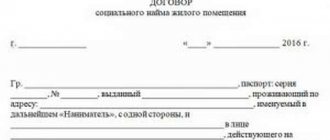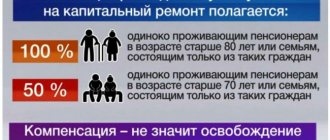A social tenancy agreement is a document under which housing is provided to a citizen for use with the obligation to pay rent on time and.
Dear readers! The article describes typical ways to solve legal problems. Your case is individual.
Under social rental agreements between the state and low-income families, rent is usually very low; sometimes citizens only need to pay their utilities on time. Such an agreement is concluded with families who need housing, but cannot buy their own apartment or house; housing is provided from the municipal fund.
A social tenancy agreement allows you to live for an unlimited time
A social tenancy agreement allows the tenant to use the residential premises and live in it for an unlimited period, without becoming the property of the tenant.
When living under a social tenancy agreement, the tenant undertakes to take part in cosmetic and major repairs, take care of the sanitary condition of the housing and comply with other requirements for living in apartment buildings.
If the tenant turns out to be a persistent defaulter, he can be evicted by decision of the municipality. In this case, he loses all rights to reside in this premises and to register in it. The eviction procedure can also be initiated based on complaints from neighbors if the tenant is constantly .
The tenant of the apartment cannot sell it, donate it or transfer it by inheritance; an exchange is possible between two premises from the city fund with the permission of the municipality. However, citizens living in an apartment under a social tenancy agreement have the right to transfer the residential premises into ownership within the framework of free housing, which has not yet ended in Russia.
The right to privatize housing is granted once in a lifetime, in which case the housing becomes full property. However, the privatization procedure will require a properly executed social tenancy agreement: where can you get it and to whom is it given?
The local administration is responsible for concluding such agreements: you must contact the Housing Department. Sometimes this department has a different name, so you need to check the name with your local government.
Who can get an apartment under a social lease agreement?
Social tenancy agreement: schematically
Housing under a social rental agreement is provided on a first-come, first-served basis to families who do not have their own living space or live in premises whose area does not meet the standards.
The following categories of low-income citizens receive priority rights to housing:
- Orphans who lived in orphanages and other closed institutions until the age of 18. The state undertakes to provide them with their own housing; accommodation under a social tenancy agreement can be used as a temporary measure.
- Residents of dilapidated houses and buildings subject to demolition. If it is decided to demolish a house that is part of the city's stock, the municipality must provide citizens with housing of equal size for use.
- Groups 1 and 2, persons suffering from severe chronic diseases. Tenants of communal apartments living next to a “dangerous” infectious patient also have the right to receive municipal housing. The list of diseases is documented.
- Combat veterans, as well as some categories of law enforcement officers.
- . This category includes families with three or more children if the income per person is less than the subsistence level.
Also, municipal housing should be provided to low-income citizens. This is the broadest category and there are a few important things to know. Those in need of housing are those citizens who do not have their own housing at all, or those who live in an apartment that is less than the established norm. This category also includes owners of uninhabitable housing.
All of the listed categories of citizens have the right to apply to the housing department of the municipality. Their appeals will be considered, and orders for the use of residential premises will be provided on a first-come, first-served basis. The right to residence is granted from the moment the warrant is received, but to secure this right and subsequent privatization of the property, it is necessary to draw up a social tenancy agreement.
How to privatize an apartment using a warrant and where to get it if it is lost
Since this process is voluntary, everyone living in it must express a desire to acquire housing rights, so everyone writes an application, including minors over 14 years of age. Children under 14 years of age are included in the contract without fail; consent is given on their behalf by their parents or guardians.
To do this, you need to contact the administration that owns the residential premises. Data recovery is carried out on the basis of the archive existing in the organization. Based on these records, residents will be issued a certificate of grounds for occupancy.
Place of receipt of the social tenancy agreement
Social tenancy agreement: sample
Very often, tenants live in social housing for years, and no additional documents are required from them. The need to obtain a social rental agreement for housing arises in several cases:
- If this housing is to be privatized in the future. The terms of free privatization are limited, and although they have been extended several times, it is better not to delay in submitting documents for the transfer of housing.
- If you are planning to exchange social housing with another tenant. This is possible if you need to change the area and in the desired part of the city there is a house that is part of the city housing stock.
- If you want to sublet your home. Such a transaction is more difficult to formalize legally, since formally the apartment is not the property of the citizen.
You can obtain this agreement from the housing department of the municipality, where the decision was made to provide housing for temporary use and register the family as needing housing. To draw up a social tenancy agreement, you will need the following set of documents:
- the responsible tenant and all family members who will live with him. It is also necessary to provide birth certificates for children.
- , as well as your personal account number.
- A document according to which housing is provided for use under a social tenancy agreement. This is either a housing order or an extract from a municipal decision.
- on concluding a social rental agreement. A sample of filling out this document is easy to find on the Internet, but the application can be written on the spot.
There is no need to pay any fees; the application and set of documents are reviewed free of charge. Usually their verification does not take more than a month; after this period, municipal officials must draw up an agreement, which is signed by the employer and an authorized person.
When submitting a package of documents, you must take a receipt for receipt; this is a guarantee that they will not be “lost.”
How to change a social tenancy agreement?
Required documents for social hiring
Since a social tenancy agreement is concluded for tens of years, during this time a variety of changes can occur: a change in the owner of the building, the death of a responsible tenant, after which the right of residence passes to members of his family, and much more.
In all such cases, it is necessary to make timely changes to the contract. One of the common problems is that a building suddenly appears missing from the city’s balance sheet.
It happens that for some reason a house is transferred from the municipality department to the management of some organization, and at the same time you will have to draw up a rental agreement with it. In any case, the building remains the property of the state and does not pass into private hands.
An important rule: the right to live in the premises remains with the tenant, so you will only need to re-issue the documents. To do this, you need to collect a similar one and write an application to the new management company in order to formalize an agreement with it. You can find out who now owns the building by contacting the authority that issued the warrant in previous years.
If you need to make changes to the contract or re-register it in the name of a new tenant, you must contact the owner of the building with an application. All documents confirming the changes are attached to it: the previous employer, a marriage certificate for changing the surname, etc. The application is reviewed, after which a new contract is drawn up.
How to draw up a social tenancy agreement through the court?
Not every tenant has the right to sublease
It is not always possible for families in need of housing to quickly obtain space of the required size for use. If the family does not own their own living space, or if citizens fall into the category that requires providing them with housing, but the municipality refuses, the matter must be resolved in court.
In this case, it is drawn up, for which the municipality is the defendant. The application must be accompanied by all documents confirming that you need housing and your rights are being violated.
The court considers the filed claim and makes a decision according to which the municipality undertakes to provide the family with temporary housing in a short time. Unfortunately, the consideration of a case and the execution of a court order often takes a very long time, and citizens are unable to quickly realize their rights.
Another conflict situation is the refusal to sign a social tenancy agreement. A family can live in an apartment for years, but the rights of the residents are not documented in any way: because of this, they cannot privatize the housing or exchange it for an option of a similar size in another area.
If municipal officials refuse to sign the agreement, you must go to court. The statement of claim indicates how long you have been living in this apartment, family composition, and the reasons for the municipality’s refusal to formalize the contract. At the end of the application there is a request to oblige the owner of the building to enter into a formal agreement.
The court considers the circumstances of the case and makes a decision according to which the owner undertakes to draw up a social tenancy agreement of the established form. A statement of claim can be drawn up at home in a calm environment; a sample can easily be found online.
Russian legislation has changed significantly in many aspects over the past few decades, which has led to many questions among citizens who are faced with the need to exercise any of their rights. You should especially carefully understand the nuances of the right to use a residential building, apartment or other real estate property from the municipality.
Today, some low-income citizens, as well as preferential categories of persons who are clearly defined by regulations, can take advantage of this right. In addition to the fact that you need to confirm your right and belonging to one or another category of persons, you should figure out how to obtain a social tenancy agreement, what conditions must be met and where to draw up the necessary documents.
Since a social tenancy agreement for residential premises is a preferential lease for the population, it is drawn up similarly to any other transaction in writing. You must be extremely careful with the text of such a document. Be sure to read all clauses so that you know your rights and responsibilities, as well as the responsibilities of public housing owners and the consequences of violating the terms of the agreement.
Save your time and nerves. and within 5 minutes receive a free consultation
professional lawyer.
Preferential category
Before asking yourself where to get a social tenancy agreement for residential premises, it is worth noting that citizens can exercise their right to public housing only if they do not have any housing. This means that such citizens not only have nowhere to live at the moment, but also do not own any real estate. An exception may be the presence of an apartment that is unsuitable or too small for a family to live in, where there is less space per resident than required by law.
Obtaining an apartment under a social tenancy agreement is regulated by the Housing Code of the Russian Federation. It indicates which categories of citizens have the primary right to formalize such a transaction with the state, in addition to the mentioned low-income families and citizens:
If an individual falls into any of these categories, then he can submit an application and documents in order to issue and receive. To do this, you need to contact the appropriate government agency at the applicant’s place of residence.
Who is the owner
Such apartments belong to regional government authorities. If this is a city, then we are talking about a city municipality. Federal authorities own apartments from the state fund reserve.
ATTENTION! Living in a municipal or state apartment is regulated by Article 60 of the Housing Code.
It is this article that determines the allocation of an apartment that is suitable in size to a needy family. The Housing Code specifies which categories of housing can be allocated and the basic requirements for status.
If this is a municipal apartment, this self-government body establishes a list of categories and beneficiaries who can qualify for free social housing. Each region has such a list, most of the items are common, but there may be additions.
Special conditions
Under the terms of the above agreement, a deal is concluded between the parties, according to which the municipality transfers the living space for use to the citizen free of charge. In this case, the individual undertakes to pay for utilities, with the exception of the item for major repairs. If a low-income family wishes to draw up a social lease agreement for residential premises, the commission will take into account the family’s current living conditions and its income.
Only citizens of the Russian Federation can apply for state housing. Citizens of other states or those without citizenship at all do not have such a right.
The following families will be given priority:
- Tenants of public housing, if the current housing does not meet the established standards for the available space for each resident;
- Living in unacceptable conditions that do not meet sanitary standards or technical conditions;
- Where there is a chronically ill person, living with whom poses a threat to health and life.
Documents for execution of the contract
To speed up the decision-making process and draw up a social tenancy agreement for residential premises, it is important to prepare in advance all the necessary documents. These include:
- Statement. Written and submitted in any form on behalf of the individual with whom the contract will be concluded;
- Passport – original and copy;
- Passports of family members - originals and copies. Birth certificates will be required for children;
- Certificate of marriage or divorce;
- Documents confirming the presence of family ties with the applicant, if they are included in the text of the document;
- Orders, registrations and other documents for the right of settlement;
- , which contains information about all family members;
- A technical plan with information about all legal redevelopments, if we are talking about the exchange of living space;
- Other documents confirming the grounds for obtaining a state apartment.
When submitting an application and documents, you need to ensure that the employee responsible for admission immediately registers them and issues a receipt of receipt. If any documents are missing, this will be reported immediately, with the exception of some individual cases with controversial issues.
What to do in case of loss
Due to certain circumstances, the contract for municipal housing may be lost. It is necessary to issue a duplicate of it, since the document may be needed in different cases .
IMPORTANT! The possibility of obtaining a duplicate is provided for by law.
In order for a duplicate to be issued, you must submit an application and some documents - a passport, a certificate of family composition, an extract from your personal account. You may need to collect some other papers as well. An application for a duplicate is submitted to the local administration. Review period is 30 days from submission.
What to pay attention to when signing
To draw up a social tenancy agreement, it is necessary to obtain the consent of the municipality, and it is not possible to significantly influence this decision. Each local government body on whose balance sheet the property is located has a standard form of agreement. It may vary somewhat depending on a particular case. In general, the structure of the document remains unchanged and has the following form:
Main responsibilities of the parties:
| State owner | Tenant |
|
|
The information in this article is provided for informational purposes only. We recommend that you contact our lawyer.
A social tenancy agreement for residential premises is a document that gives the right to use state or municipal property of residential premises. The Housing Code regulates the rights of both the tenant and the landlord who signed such an act.
How to obtain a social tenancy agreement and for how long is it valid? Who can apply for government assistance and who should I contact? These are frequently asked questions from people who do not have the opportunity to independently purchase or rent living space. Low-income families with minimal income and no place to live need to become familiar with the possibilities of social assistance.
Social rented housing
An apartment under a social tenancy agreement is an opportunity to purchase living space for your own use on preferential terms. The rules and procedure for the transfer of such property are regulated by the law of the Russian Federation, chapters seven and eight of the Housing Code.
Federal and local legislation determines citizens who have the right to purchase such housing. Obtaining public housing occurs on a first-come, first-served basis. To do this, you need to submit documents and register. The social tenancy agreement for residential premises provides that after its conclusion it is possible to privatize the apartment on a general basis. This gives the resident the opportunity to rent, donate, sell or exchange an apartment or house.
How to Get a Social Tenancy Agreement If There Is No Order But There Is Registration
At the authority, you need to fill out an application, which sets out a written request to begin concluding an agreement for renting premises for housing. When filling out a tenancy agreement, you should engage a housing lawyer. If the city administration decides to refuse a person, he has the right to appeal to the courts;
- The final authority will be the real estate department of the area where the housing is located.
- Temporary. The purpose was similar to the official one, but provided more extensive rights to use housing. Issued for a period of up to 30 days or until the end of a certain period (for example, the end of the school year).
- The two apartment orders presented above are currently completely excluded from the document flow.
Who has privileges for social housing
Those who need an apartment have the opportunity to get public housing. Basic conditions for receiving assistance from the state:
- family members have not previously entered into a social rental agreement;
- if citizens or they have living space less than the established norm;
- if citizens live in an apartment that does not meet the necessary requirements.
- children who were left without parents;
- seriously ill people with a chronic form of the disease;
- people who live in premises unsuitable for living.
People of a special category, who are determined by special federal laws, have the right to receive an apartment from the state fund. These include:
- people with first and second group disabilities;
- victims of the accident at the Chernobyl nuclear power plant;
- veterans of the Great Patriotic War;
- citizens who lost their living space during a catastrophe or natural disaster;
- military personnel who received serious injuries in service.
Categories of citizens
- The main category is low-income, low-income families. The income does not allow them to raise their own funds to purchase or build real estate. And to ensure normal living conditions, low-income families are allocated housing from the municipality.
- Large families also have the right by law to apply for an apartment. Sometimes difficulties arise with choosing housing for them, since the apartment must have many rooms for children, especially those of different sexes.
The rights of low-income people and families with many children to a municipal apartment are determined by Article 49 of the Housing Code of the Russian Federation. These categories are put on a waiting list for housing on preferential terms. But first they need to obtain a document confirming their status. To be placed on a waiting list, you must contact your local authorities.
An apartment can also be provided by the state. A social tenancy agreement is drawn up with the owner of the residential premises where a large or low-income family will live.
In all regions, the main categories of the population are identified, which, for one reason or another, have the right to free housing in 2021:
- Veterans of the Great Patriotic War.
- Persons who became disabled as a result of participation in the liquidation of the Chernobyl Nuclear Power Plant.
- These are disabled people of groups I and II.
- Those who lost their home or apartment due to a natural or man-made disaster.
- Persons with a disease from a specially established list.
- Military personnel injured during military operations.
There are many categories, each of which has grounds for receiving free housing. At the level of regional legislation, resolutions are adopted that form such a list, add additions to it, and explain the conditions for issuing an apartment.
At the state level, a list has also been adopted that is valid in all regions. It includes several categories:
- Low-income families.
- Families with many children.
- Residents of emergency housing.
- Residents of municipal houses slated for demolition.
Another opportunity to get an apartment is to live in a house that is being transferred from residential to non-residential. With such a transfer, the administration must provide residents with housing that meets all the requirements for comfort and space.
Several queues may form in a municipality. In addition to those that include applicants for free housing, there are also queues of citizens who want to exchange an apartment with a large area for a more compact one.
There are many advantages to such an exchange - a citizen will pay less for utilities and can get housing in a more prestigious area or in a newer house.
Social tenancy agreement: how to get it and where to apply for it
Based on the decision to transfer the living space to public rent, a contract is signed. You can sign and receive it from government agencies or the municipality. It all depends on who provides social assistance. Such an agreement includes:
- exact details of the landlord and the details of the tenant;
- data of the transaction object;
- a complete list of residents who will live;
- rights and obligations of the parties to the transaction;
- the conditions for termination of the contract are specified;
- signatures of both parties.
To conclude a contract, citizens must submit a certain package of documents. Required list of documents:
- Copies of documents of the whole family: birth certificates, passports, marriage certificates and so on.
- A certificate confirming permission to issue an apartment.
- If citizens live in emergency premises, then they must present an act of demolition of the building or its transfer to non-residential use.
- Certificate from the house register at the place of registration of all family members.
- Bank statement about financial condition.
- An extract confirming the absence of residential property.
After submitting the required package of documents, a receipt will be issued and a date will be set for concluding the contract.
Documentation
An application to be placed on the housing queue must be supported by documents, otherwise it will simply not be considered. What do you need to prepare before applying to municipal authorities for housing?
- Documents regarding family composition are required. These are passports, birth certificates of children.
- You will need an extract from the registration of apartment residents.
- An extract indicating the lack of housing for each member of the family.
- Municipal decision regarding the provision of an apartment.
- If the basis for obtaining a new living space is the demolition of an old house, you need to have documents on hand that will confirm such a project.
These documents are attached to the application. Sometimes the department where registration is carried out may require other papers, so you need to ask about the list in advance.
Features of the contract and types of living space
Residential premises provided under social tenancy agreements cannot be common rooms or non-isolated living quarters. Living space includes:
- A house or half a house.
- An apartment or half an apartment.
- A room in an apartment or house.
According to the rental document, the living space is transferred from the owner to another person for temporary use for an agreed fee. There are two parties to the transaction:
- The landlord is the owner of the property. If this is public housing, then the owner is the municipal housing fund or the state fund.
- A tenant is an individual who will live in an apartment or house and make a certain payment for it.
The social rental contract must indicate the object of the transaction. The agreement must indicate:
- complete data on living space for social rent;
- exact address, square area and floor;
- an accurate description of the room itself and the objects that are in it.
Is it necessary to draw up a social tenancy agreement for housing if there is a warrant?
a single housing document (extract from the house register, if necessary, an expanded extract from the house register with full information about citizens living in the residential premises, as well as those who previously lived and those who left for the period from the date of issuance of the document specified above in subparagraphs “a” - “d” ";
The parties to the social housing tenancy agreement are: the Lessor, on the one hand, and the Tenant, on the other. According to Art. 62 of the Housing Code of the Russian Federation, the subject of a rental agreement can only be an isolated residential premises: a house, apartment, room, part of an apartment or house. All this is an essential condition of the social tenancy agreement.
Termination of the deal
The term of the social tenancy agreement is not established and is unlimited in accordance with Article sixtieth of the Housing Code of Russia. But there are situations when the lease contract is terminated legally. A resident who has rented residential premises can terminate the transaction at any time and move to another place of residence. The owner may terminate the contract based on the following circumstances:
- If the resident uses the rental space for other purposes.
- If there is a violation of the rules of residence and disturbance of the peace of surrounding residents.
- A social tenancy agreement (according to the Housing Code) provides for termination if the tenant does not pay for housing within six months.
- Utilities are not paid for six months or more.
- Termination of the contract also occurs in the event of the death of the tenant or if the living space becomes unsafe for habitation.
Living space sizes for low-income people
The size of a residential premises is determined in accordance with article fiftieth (parts one and two) of the Housing Code. Social housing standards are set by local governments. Each resident is provided with a living space with the appropriate area in accordance with the law. The size of the area depends on the number of people living:
- 33 square meters are provided for one resident;
- for two residents - 42 square meters;
- for three residents or more, 18 square meters are provided for each resident.
The square footage of the premises may be reduced by ten percent if the required living space is not available.
Required Payments
How to get a social tenancy agreement and how much do you need to pay monthly? General rules exist for all tenants if the living space is for commercial rent, social rent or free use. Residents must pay utility bills on time and make payments for maintenance or repairs.
Commercial rent does not have preferential discounts on utility bills, and housing costs are much higher than social rent. If a contract for free use has been signed, then tenants can take advantage of discounts and benefits when paying for utilities. Residents do not pay for the living space itself. Rent under a social tenancy agreement provides benefits and discounts on utilities and housing costs.
Social tenancy agreement, if everyone included in the order has already died
1. Family members of a tenant of residential premises under a social tenancy agreement include his spouse living with him, as well as the children and parents of this tenant. Other relatives and disabled dependents are recognized as family members of the tenant of the residential premises under a social tenancy agreement if they are settled by the tenant as members of his family and run a common household with him. In exceptional cases, other persons may be recognized as family members of the tenant of a residential premises under a social tenancy agreement in court.
To conclude a social rental agreement, you should contact the housing department of the relevant Housing Policy Department. The following documents are submitted to this body: an application, an identification document of the applicant, copies of identification documents of all family members. You may also need a document confirming marriage or divorce, or a death certificate.
Rights and obligations of the employer
The obligations and rights under the social tenancy agreement are specified for both parties. Article sixty-seven regulates the rights and obligations for the tenant. Responsibilities of the employer:
- Use the living space exclusively for its intended purpose.
- Keep the premises and property in it safe and sound.
- Maintain the apartment in proper condition.
- Carry out repair work if necessary.
- Pay rent on time and in full.
Tenant rights:
- Rent out.
- Move into the apartment persons not specified in the contract.
- Require the landlord to comply with the terms of the contract.
- Allow other persons to reside temporarily.
- Complete a home exchange.
Paper dispensing
A social tenancy agreement is an important document that gives the right to use municipal housing and live in it. You need to be responsible when drafting and signing it. To receive the contract in hand, you must appear on the day specified in the receipt.
The agreement is drawn up in two copies, only one is issued to the citizen who received the housing for use. The second remains with the owner, for example, in the municipal administration
Rights and obligations of the landlord
Article sixty-five of the Housing Code of the Russian Federation regulates the rights and obligations of the owner. Responsibilities:
- Provide the tenant with free space.
- Provide high-quality public services.
- Make repairs if necessary.
- Participate in the activities of the home.
Property owner rights:
- Receive payment for housing on time.
- Demand payment of utilities.
- Demand compensation for damage to property or premises.
According to a social tenancy transaction, additional rights and obligations may be specified for the two parties.
Necessary steps to obtain an apartment
A social tenancy agreement has been drawn up, how to get housing? There is a special algorithm of actions that must be followed in order to obtain housing under a social rental contract. Sequencing:
- A needy resident should register for housing.
- Receiving a written decision on the provision of an apartment.
- Collection of the required package of documents.
- Based on the contract, move into the apartment.
By law, such housing is provided to a resident in the same area in which he has a residence permit.
A warrant as a document giving the right to move into an apartment
Lawyers advise restoring the document and performing this procedure at the legislative level. To obtain a warrant or a restoration procedure, if it is lost, a citizen will need to contact the territorial administrative authorities at the location of the residence, where all information about issued warrants with entries in house books is stored.
To privatize housing, you need to collect a package of documents. This list also includes a warrant for an apartment. The social rental agreement has the same legal force. If the order is lost, then for privatization it will be enough to conclude a social rental agreement. A sample agreement can be obtained from the service company.
We recommend reading: How to register a house in a dacha
Social tenancy agreement: how to get social housing in Moscow
The agreement is the main document for renting living space. A warrant is a document that only establishes privileges for use. A warrant without a contract does not confirm legal ownership of social premises.
The Moscow Department of Housing and Policy exercises the powers of a landlord (only in Moscow). Since 1999, they have been signing a social contract with Muscovites. Without signing such a document, Muscovites will have problems with Housing and Operational Control and with other government bodies. Without this document, the resident will not be considered a legal employer.
In accordance with the law, the Moscow department must ensure that citizens who have warrants or other acts of use register and conclude a social housing transaction on behalf of the city of Moscow.
Eviction of residents from social rental apartments
To evict a tenant from a social apartment, you must go to court. Eviction options:
- Replacement of living space with more comfortable living conditions. This situation arises if the house is subject to demolition, if it is necessary to convert residential premises into non-residential premises, or if the house requires complete reconstruction. In addition, if the residential premises are required by law to be given to a religious organization.
- Relocation to a dormitory if the size of the premises complies with legal requirements.
- Eviction without provision of housing. This situation may occur if a resident and his family use an apartment or house for other purposes, violating the legal rights of neighbors. Without providing other housing, parents who have lost parental rights may be evicted.
There are no other eviction options.






